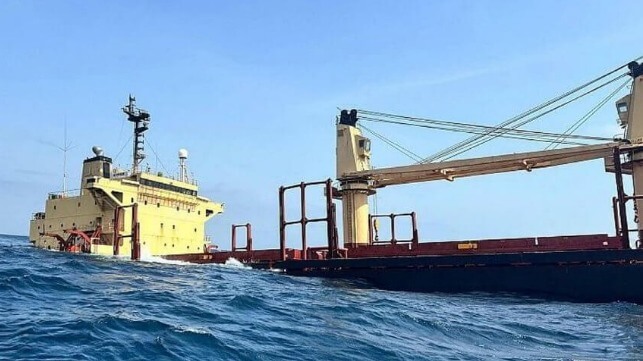The bulker several damaged in a Houthi attack and abandoned by its crew finally succumbed to its damage reportedly sinking after having drifted since the February 18 attack. The government of Yemen issued a statement reporting the sinking of the Rubymar followed by an update to its previous reports from the UK Maritime Trade Operations.
The attack was reported to have taken place in the range of 15 to 25 nautical miles from the Yemeni port of Al-Mukha. The UKMTO in its statement confirmed the vessel had been dragging anchor. Previous analysis reported by Sky News calculated the vessel had drifted approximately 37 nautical miles north in the Red Sea.
The Yemeni government statement said the vessel was lost as the weather deteriorated on March 1. Previously it was said the vessel was continuing to take on water and images released on Yemeni TV earlier in the week clearly showed that it was continuing to settle at the stern. The BBC had published pictures a few days earlier showing the stern still above the water. Efforts to salvage the vessel and tow it to a port possibly in Djibouti or Saudi Arabia were hampered by the security situation in the Red Sea.
The government statement reported the bulker Rubymar registered in Belize was lost in a position about 11 miles from the nearest point of land in Yemen. It is unclear if any crew or authorities were at the ship when it was lost. The crew was evacuated immediately after the attack and taken to Djibouti where reports said they were flown home.
“The Yemeni government holds the Houthi militia responsible for the environmental disaster, and the repercussions of its continued targeting of shipping,” the government said. They reiterated that the Rubymar was carrying 41,000 tons of fertilizer as well as oils and fuel. The U.S. Central Command a week ago highlighted an 18-mile oil slick formed behind the damaged ship.
The statement from the spokesperson from the Yemen government highlighted the danger coming from the phosphate and other dangerous chemicals saying it was likely an algae plum would form which could result in the death of the coral, kill marine animals, and possibly damage desalination plants in the region. They referred to the “recklessness and indifference to the catastrophic repercussions,” using the loss of the Rubymar to call for further international action against the militants.
The loss of the Rubymar would be the most significant casualty since the Houthi attacks began in November days after they seized the car carrier Galaxy Leader. UKMTO calculates a total of 55 commercial ships have been targeted by the Houthi. While they were also successful in causing a significant fire on the Marlin Luanda in late January, and multiple strikes on vessels, the 32,200 dwt Rubymar (564 feet/172 meters in length) would be the first vessel to sink. Reports have alternately linked it to UK ownership although the manager is based in Lebanon.
While most of the leading shipping firms have diverted vessels away from the Red Sea region, many ships are still operating in the area. This week the Houthi leader Abdul-Maliks said “We have a big surprise that the enemies do not expect, and we will indeed start it.” He wrote on social media of the “greater effectiveness” of the operations while the group has vowed to continue in support of the Palestinians living in the Gaza Strip.
Reference: https://maritime-executive.com/article/rubymar-sinks-in-red-sea-12-days-after-houthi-attack-damaged-bulker

